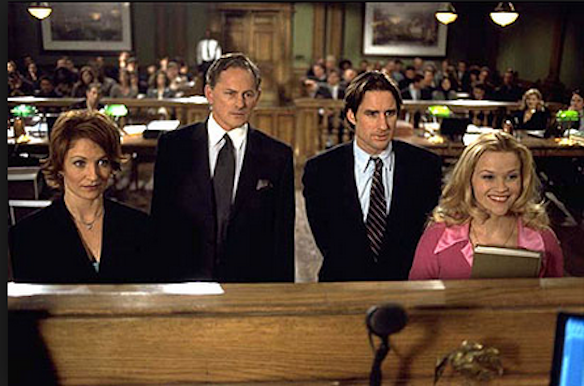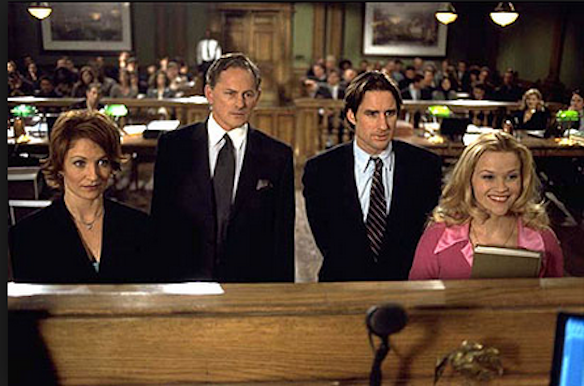
Are You Sure You Want To Be A Lawyer?
As someone with a juris doctorate (JD), but with no intention of practicing, I think I might have a few unique insights to share with anyone considering going to law school.

I graduated law school about five years ago and haven’t practiced law a day in my life. In some ways the jury’s still out on whether law school was – financially speaking – a mistake for me or not (sorry for the pun, I couldn’t resist). But it was such an important and formative time in my life that even if it was a mistake, it’s a mistake that’s now so core to my being that undoing it would be truly unimaginable. Plus, the great job I have now is, at least, partially the result of me having a professional degree. However, as someone with a juris doctorate (JD), but with no intention of practicing, I think I might have a few unique insights to share with anyone considering going to law school.
I guess I have to start with what motivated me go to law school in the first place. I think, like many people interested in law school, I exhibited certain lawyer-esque qualities from a young age. I had a Type-A personality which meant I liked to be in control and was competitive. It also meant I enjoyed arguing and always tried to have the last word. I was also a huge smartass who would take advantage of any poorly worded statement or instruction, and I was also very concerned with fairness, even as a child. All this resulted in many adults telling me, perhaps sarcastically, that I should become a lawyer.
However, law school didn’t really cross my radar screen until I moved to Africa when I was 18 to do volunteer work for a year. While I was there, I met person after person managing NGO’s and non-profits, my dream jobs, and they seemingly all had law degrees. Furthermore, things these people told me about having a law degree really cemented the idea that law school was the right move for me. They said things like, “a law degree is a jack-of-all-trades master’s degree,” and that, “a person with a law degree is seen as being able to do just about any kind of professional work.” In other words, it was better and more employable than a master’s degree.
Now that I have law school learnin’, I can agree that it’s a very versatile education. In law school you don’t so much learn the law as you learn how to study it, and that requires learning how to analyze information, think critically and learn new systems quickly. So yes, someone with a JD can learn to do a lot of things well with a pretty small learning curve. However, the stuff about it being seen as a jack-of-all-trades master’s degree was horribly out dated. The people I was talking with back in the late 90’s were ten to twenty years out of school. The world had changed during that time. Where they might have been competing with someone with a master’s in political science for a job at an NGO in southern Africa, today someone with a JD is competing for that job against someone with a master’s degree in southern-African NGO management. This isn’t to say a law degree won’t open doors for you outside of the legal field; it’s just to say that in the past where those doors might’ve flown open, today they’re only cracked. But this, obviously, has nothing to do with why I don’t practice law.
One reason I don’t practice is that I’m legally prohibited from doing so. While I wish there was some awesome story of a crazy act of rebellion during my law school days that resulted in me being banned from ever setting foot in a courtroom, the reality is I haven’t taken a bar exam. So, while I do have a law degree, I am not legally permitted to represent someone in court. But the much more important reason is because I never actually wanted to. While living in Africa, I decided I was more into policy, but viewed a law degree, based on the advice I got, as a good way to get into that field while not limiting myself with a narrowly focused master’s. But, like I said, the world changed and now people have these overly-focused master’s degrees and are essentially becoming experts in every tiny little field of academia imaginable. While it’s not good for their overall employability, it makes them tough to compete against when they’re on their home turf.
All this said, why I don’t practice law and why I don’t want to are two very different issues. Other than actually preferring policy work, the reasons I don’t want to practice range from the fact that I find so many aspects of the job incredibly boring to the massive issues I have with America’s legal system, which are so numerous I could write a lengthy book.
I’m very confident that anyone who is seriously considering being a lawyer is well-aware that it’s nothing like what we see on TV. However, I don’t think it can be emphasized enough: IT’S NOTHING LIKE TV. It’s more like doing homework for a living. You’ll be spending hours a day poring over books and documents. It’s writing non-stop. It’s meetings after phone calls after meetings, all while constantly dealing with hyper-competitive, Type-A pricks who are trying to trick you. And it’s almost never arguing in a courtroom in front of a jury (which is the part I would actually like).
While not all areas of law are created equal in terms of how interesting they are, I find that there is a direct correlation between how interesting an area of law is and how morally questionable it is. Wills, trusts and estates: No moral dilemmas there, but, as you might suspect, it’s boring as hell. On the other end of the spectrum is the fast paced world of criminal law: interacting with cops and bad guys, trying to develop a theory of the case and a decent chance of actually going into court, but moral landmines all around. And at the end of the day, you’ll end up trying to help guilty people get off or trying to put people whose guilt you’re not certain of away. I know all the philosophical arguments behind the legal system we have and why our system is set up the way it is, but it’s just not something I’m comfortable with.
The happy medium might be contract law or civil litigation (where you just sue people for money), I personally found both these fields to be pretty interesting and could see myself being able to do some good, but the people who have the money to pay you when it comes to these areas of law are the big corporations, and I don’t want anything to do with them. And as for getting that headline-making case involving a civil rights or constitutional issue: that’s a one-in-a-million, once-in-a-career kind of thing, at best. Unless, however, earning money isn’t actually a concern for you, in which case you can chase down the interesting cases that won’t pay you a dime for years, if at all.
The reality of the modern legal profession is there are very few good-paying jobs. This means no matter how well-intentioned someone is, if they aren’t independently wealthy, they could easily find themselves in a position where they are not able to pick and choose their cases or clients and have to take whatever they can get. This can, as a result, put them in a position where they’re constantly questioning whether they’re doing more harm than good, which is a career concern fairly unique to lawyers.
At the end of my first semester in law school, my torts professor gave the class what he called a soapbox speech where he dropped the pretense of being an objective instructor and made his personal opinions known (most of his students would argue he regularly made his opinions crystal clear). In his speech, he laid out the realities of being a modern lawyer with a few simple facts: Most lawyers make far less than what people think. Most lawyers only practice for 5 years before leaving the profession burned out. Lawyers have some of the highest rates of alcoholism, depression and suicide of any profession. The more educated a person is the more likely they are to despise lawyers, and, perhaps most telling of all, 2/3 of lawyers do not want their children to become lawyers.
He went on to talk about the two types of students he saw every year in his classes: those who were there for the intrinsic value of the education and those who were there to become lawyers. The people who were there for the education normally didn’t practice law long, if at all, according to him. They also tended to only do well and enjoy law school during the extremely difficult first year. Once they figured it out, he said, they simply cruised through to graduation because the initial challenge of the most rigorous year in academia was over. My professor had my number.
Don’t get me wrong, I love the education I got in law school, and I enjoyed it as an intellectual challenge. I also take a lot of pride in the fact I was able to get through something that was so insanely rigorous. The education I got was so thorough that it changed the way I think and process information, and the non-legal jobs I’ve had since graduation I’ve done better at as a result of my education. But it didn’t come without a price and relatively speaking, I’m better off in terms of debt than a lot of law grads because I went in-state and had a fellowship my first year. But still, the debt I incurred means more than just that I owe someone money. It means there are non-profit jobs I would love to take but can’t because I wouldn’t be able to get out of debt any time this century. It means I can’t just pick up and move, and go open a hostel on a beach in some tropical paradise like I often think about. Every move and decision I make in life is weighed against how it will impact my ability to pay my student loans. It’s a shitty position to be in and one that is unique to America (but that’s for another article).
If law school was free, I would highly recommend it to anyone who was interested. But it’s not, and the modern reality is it won’t be worth the cost for a large number of people who attend. There are far more lawyers in the world than there is need for them. So, for people who view it as a payday, think again. The jobs that pay well are for top students from top schools and the well-connected. If you think it’s a good way to get into another field, there’s likely a cheaper and faster way. For people viewing it as a good education, you’re right, but there might be better, cheaper options to explore first. However, for those of you with a lot of passion for the law and want to actually practice it, I can’t relate to you on any level, but go for it. You’ll have to work crazy hard to even have a chance at being successful, but at least you’ll have passion to motivate you instead of a passing interest or greedy desire. ![]()











